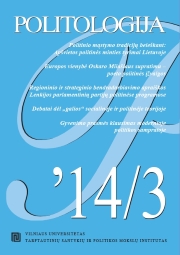EUROPOS VIENYBĖ OSKARO MILAŠIAUS SUPRATIMU – POETO POLITINĖS ĮŽVALGOS
UNITY OF EUROPE ACCORDING TO OSCAR MILOSZ: POLITICAL REFLECTIONS OF THE POET
Author(s): Rosita GarškaitėSubject(s): Politics / Political Sciences
Published by: Vilniaus universiteto leidykla & VU Tarptautinių santykių ir politikos mokslų institutas
Summary/Abstract: The article examines the heritage of poet, mystic and diplomat Oscar Milosz (1877–1939) from the point of politically significant ideas. The aim is to grasp the understanding of the unity of Europe from the selected political articles “Deux messinismes politiques” as well as metaphysical poems “Ars Magna” and “Les Arcanes”. The premises of Milosz are situated in the intelectual context of European unity ideas of his contemporaries. The analysis shows that Milosz is critical about the situation of interwar Europe that he faces. As an alternative to this he suggests the unity in spiritual an political sense. It is argued in the paper that poet tries to capture the main questions of his epoch, although in very exclusive manner by lumping together geopolitical, mithological, messianistic arguments. In the 21st Century most of the discussions about Europe are based on the question How and not Why. Fundamental debates on the identity of Europe are left for the representatives of the Catholic Church or the scolars, while politicians occupy themselves with the bureaucratic activities in EU institutions. Oscar Milosz (1877–1939) was also involved in politics, during the interwar period he worked as a respresentative of Lithuania in France. However he was a writer and mystic as well, who left not only his works of fiction and poetry, but some political writings too. He is not well-known for Lithuanian readers, still his heritage is rather analysed in the academic literary field as well as from the philosophical point of view. However there is a question on Europe which has not been raised and answered, though Milosz had paid some attention to it in his metaphysical poems and political writings. The aim of the paper is to grasp the understanding of the unity of Europe from the selected political articles “Deux messinismes politiques” and metaphysical poems “Ars Magna” and “Les Arcanes” of Milosz and situate it in the context of the ideas of his contemporaries, in particular catholic pro-federalists and the Paneuropean movement. The analysis shows that Milosz is critical about the situation of interwar Europe which he faces. On the one hand, the countries are too interested in material goals and politics is not based on moral principles. On the other hand, poet reflects the wrong metaphysics of his time, because the people are sceptical towards the faith. Nevertheless Milosz should not be considered as a pessimist, because he proposes ideas how to save Europe. His premises on the unity of Europe can be divided in three parts: goal, manner and foundation. The first one is a goal of European unity. From the Milosz point of view, the unity is natural situation, which is going to be reached together with the moral evolution of European people. This differs from mostly pragmatic approach to this question by his contemporaries paneuropists.
Journal: Politologija
- Issue Year: 2014
- Issue No: 3 (75)
- Page Range: 28-57
- Page Count: 30
- Language: Lithuanian

